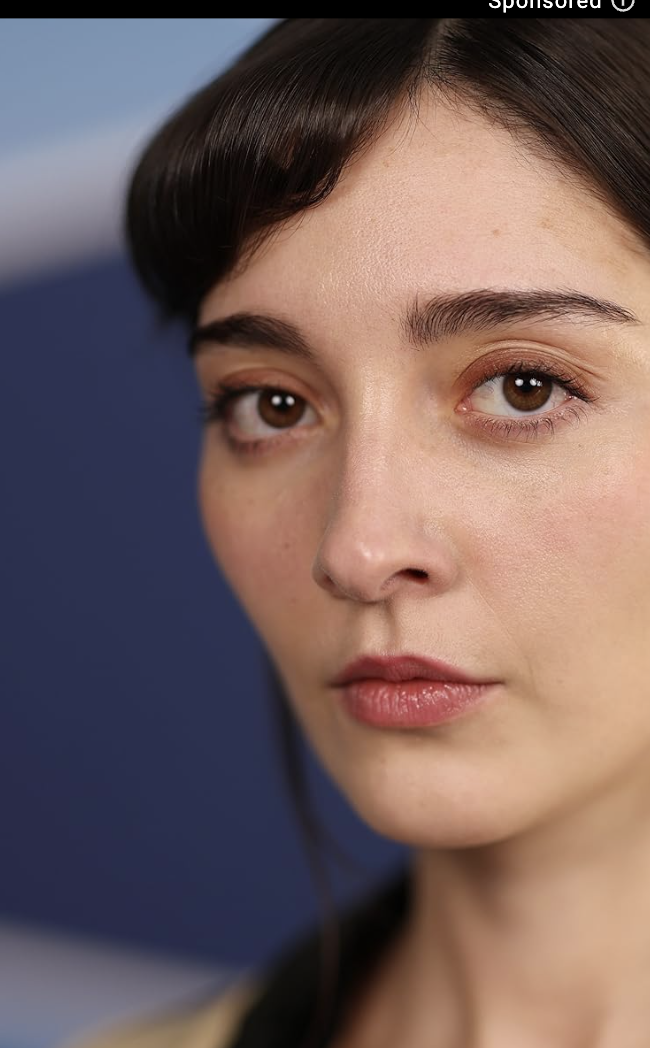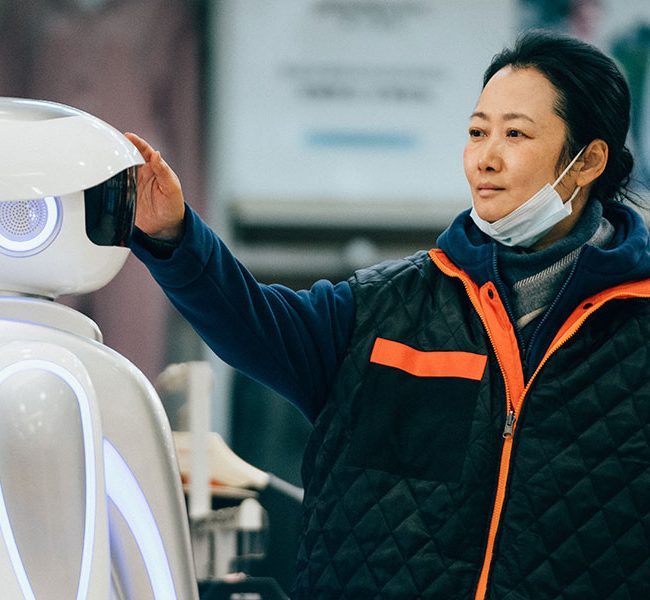A Conversation with Sophie Kargman (SUSIE SEARCHES)
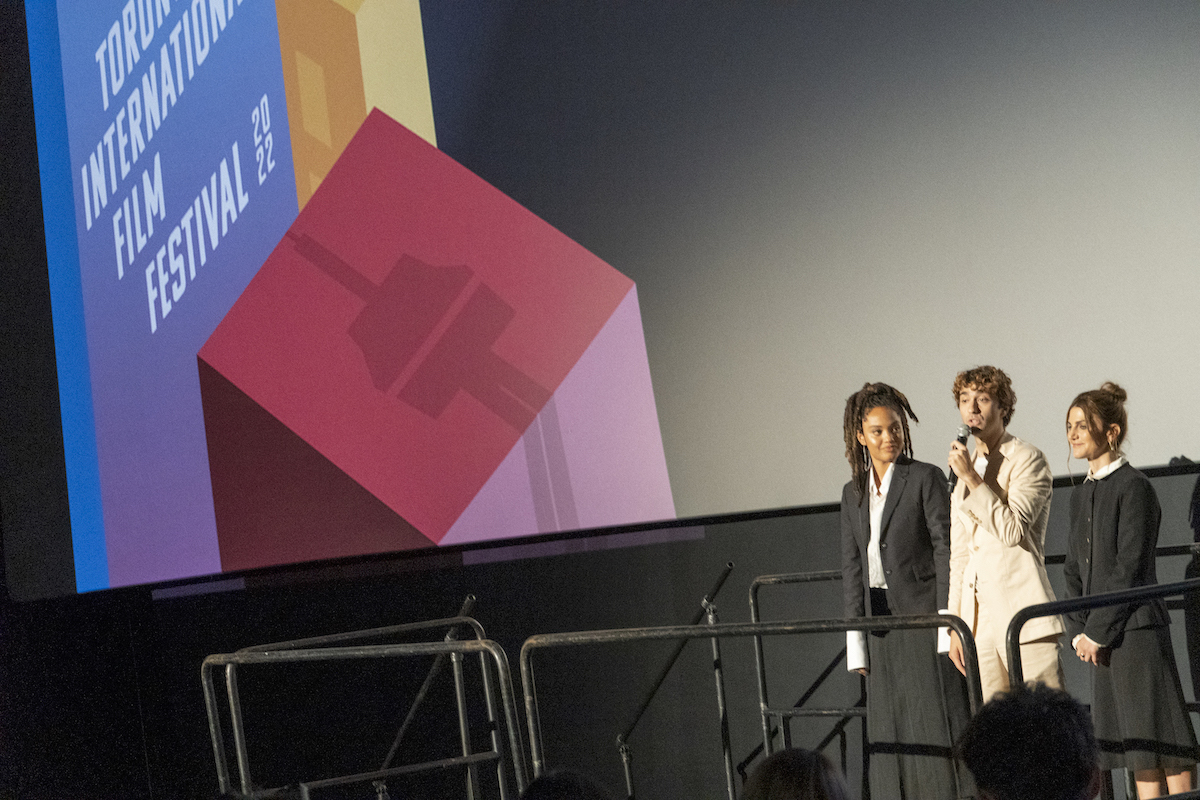
Director Sophie Kargman made her feature debut at the 2022 Toronto International Film Festival (TIFF) with Susie Searches (which I also reviewed). It’s a whimsical thriller about a young woman obsessed with true-crime stories who would do anything to promote her podcast about them. When a college classmate is kidnapped, she surprises everyone by finding him before the police do, making her a sudden star. What should she do next? Starring Kiersey Clemons (Asking for It), Alex Wolff (Castle in the Ground), and Jim Gaffigan (Collide), the movie is both a lot of fun and very disturbing. A few days after I left the festival. I spoke with Kargman via Zoom. Here is a condensed digest of our conversation, edited for length and clarity.
Hammer to Nail: Let’s start with something I know nothing about because I haven’t seen it, although I did watch the trailer, and that is your 2020 short of the same name, in which you played the title role. What made you want to turn it into a feature?
Sophie Kargman: Believe it or not, we actually went out with a short proof of concept and the feature screenplay at the same time. This is me and my co-creator and writing partner, Will Frank. The goal was always to have this duo, which was the proof of concept and then the screenplay, and to go out with them as a package deal. The reason why is because the tone of the film is really unique, and I think very often in this industry, people are looking for reasons to say no. And I think I wanted to limit the nos as much as possible, and this was a good way to show what I could do as a director, but also really illustrate the unique tone of this film.
HtN: That makes a lot of sense. Your background before doing this is mostly on the acting side, correct?
SK: Yes.
HtN: And then you made another short film, Query, as well, after the Susie Searches short. What made you want to transition into directing? Or was that always what you wanted to do?
SK: That’s a great question. Susie Searches was something I always wanted to direct, and after I directed the short, I had this moment of epiphany and I was like, “I need to direct something else that I’m not in.” Because I think it’s really tough to do it all, especially when you’re making a short film, and also producing it and doing craft services and doing the drop-offs and the pickups and the wardrobe and basically everything, all to cut down costs. And I so badly wanted to direct something else that I wasn’t acting in, because I felt like that was the only way I would really get a real idea of what directing was.
Basically what happened is, I was meeting with production companies and financiers, and in the meantime, I was like, “I need to direct something else.” And so I went to my other frequent collaborator, Ryan Farhoudi—I just go back and forth from Will Frank and Ryan Farhoudi—and I was like, “I want to make a short that is super contained, a simple setup and a payoff: one location, two actors, less than 10 minutes, couple thousand dollars, one day of shooting.”
And we tossed around ideas. I ended up going grocery shopping and came back, and Ryan had written the rough draft for Query. And I tinkered with it for two weeks, two weeks later we were shooting, and two weeks after that we were picture locked. So from inception to picture lock was a month and a day, and then it was on Query where I had this moment where I was like, “Oh, this is where I feel most in my body.” All my various skills had finally, I felt, been leading up to this moment of directing. And then once I started directing, I realized I couldn’t do anything else.
HtN: You found your vocation. That’s wonderful.
SK: I found my vocation.
HtN: In terms of Susie Searches, what was your original impetus to tell this particular story? Do you love true crime, true-crime podcasts, podcasts in general?
SK: All of the above, but really it was mostly my want to make a story that felt very topical. I think that now, more than ever, we live in a society that has this desperate fixation with the need for love and validation. And I really wanted to make something that explored how far one could go to get that, how far one could go to capture an audience. That was really interesting to me. I think that I also really wanted to make a cautionary tale that spoke to Insta-celebrity and that desire for fame and becoming Insta-famous. That also feels quite universal. I think this desire to be seen is timeless.
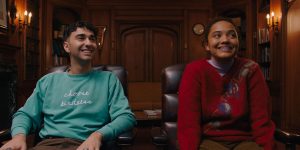
A still from SUSIE SEARCHES
HtN: But you also make Susie more than just a fame seeker. You give her a pretty robust backstory, including the story of her mom. It makes her somebody that you’re rooting for. I personally wanted her to get away with everything in the film.
SK: So happy! That was the goal. People are complicated. Humans are just human and we’re all the same, and I want to tell the story of someone who’s complicated. At the end of the day, I hope that we all see ourselves in Susie. I certainly do. Yes, Susie makes some morally complicated choices, but she’s not a sociopath. She’s just a person bumbling, trying to survive. She’s human.
HtN: Some people might disagree and say she’s a sociopath for what she does, but I agree a hundred percent that she is fully human, and that’s what I liked about her and the way you wrote her. So, why the braces? Is that something from your own background? Because you have it in the short, and obviously the short’s a proof of concept, but you focus so much on that close-up of her braces.
SK: There was actually another thread, I don’t want to say a B-story, but when you’re making a movie, you have to cut things tighter and tighter, and you want to make the tightest version of your film. And that was actually a storyline that I talked a lot more about, but we ended up cutting it in the edit room. Let me speak to this backstory, because I think it’s really interesting and informs who she is. But basically Susie always had sort of messed-up teeth and she wasn’t able to pay for their repair, and then her mom was diagnosed with MS. And so she’s working three jobs to support her mom, and she always wanted braces, but she had to put that to the side because she had to support herself and her mom.
And she talks about that, actually, in a scene where she says, “It’s taken me 13 years to save up for these braces, but I finally got them, and I’m really proud of them, because I did this, and it makes me feel good. I finally got what I really wanted.” And I think that idea also makes her a little bit more of a fish out of water, but she’s actually very proud of her braces, and she had screwed-up teeth before, and she finally is getting them fixed. But I think that also gets wrapped up in this idea that she really desperately wants to be heard, and she wants her work to be heard. It’s not like she wants to be a celebrity. She wants her podcast to have success, she wants to get sponsorships. And ultimately, everything that she does is to give her mom a better life. That’s a really human thing to do.
HtN: Absolutely. How did you cast Kiersey Clemons, Alex Wolff, and Jim Gaffigan, the three bigger names?
SK: I’ve always been a fan of Kiersey. I think she’s a tremendous actress. But the reason why I thought of her for Susie in particular is because of her emotional agility, her ability to navigate Susie’s peaks and valleys. And the confidence. I think I’ve seen her in everything she’s ever been in. I can’t remember if we offered her the role and then we met, or we met and then I offered her the role, but the point is that I wasn’t going to have her audition because she has such an amazing body of work. I am always surprised when directors ask actors who have so much work to audition, unless they’re playing something that’s so different, in which case that makes a lot of sense.
For Susie, Kiersey had never played anything like this before, but I felt like the sum of what she’s done before could make up what Susie was. You have to take a little bit of a leap of faith, but I was a fan of hers, and she astounded me every day. I love watching her on screen. I think Kiersey is a tremendous talent, and I don’t know about you, but I find that she has this ability … she never has a bad take. She’s so fun to edit. She takes direction so well. We could spend the rest of the interview talking about Kiersey and my love of her, but I think she’s special. So special.
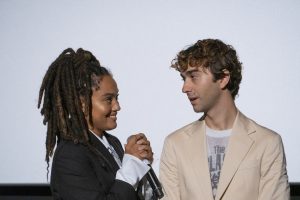
Kiersey Clemon & Alex Wolff
I was also a fan of Alex’s. What I was excited mostly about the idea of Alex as Jesse was that I’d seen him do these unbelievably dark, heavy roles. His emotional well is endless. And he’s a chameleon. He also has a love of the craft of acting. He’s a method actor. He made an Instagram page for Jesse, “Jesse Wilcox Loves Peace,” which still exists. He was very into creating a real persona. He was going outside in, so he shaved his head and pierced his ear. He’s all about the craft of acting, which I really love, and I love that he threw himself into Jesse. I’ve never seen him play someone that was so light and funny and naïve. He has got this beautiful naïveté that is really special.
I really won the lottery with these two, and I love them as people. I think that’s the most important thing. I just love these humans and I feel so grateful that they trusted me to tell the story and to direct them and to take chances, and to not protect themselves, because you never know with a first-time feature director.
And with Jim, Jim is the funniest. To me it was like he could play this role and just blow it out of the water. And he did just that. He was on tour, and he was able to fit this into his crazy schedule and he showed up and he was such a joy. He’s just so funny, he’s so disarming, he’s just a lovely guy. And I could go on and on about the other actors, like Ken Marino and David Walton and Dolly Wells and Isaac Powell and Rachel Sennott. I love Rachel. These actors, they’ve raised the bar. I don’t know what I’m going to do, moving forward, because I just love these actors so much.
HtN: You’ll have to cast them over and over again.
SK: I know! I will.
HtN: I also want to ask you about composer, Jon Natchez, and how you found him, because I really enjoy what he did with the score.
SK: Jon is in this band The War on Drugs and what happened is that my longtime composer Daniel Hart— Daniel Hart did the short of Susie Searches—who does all of David Lowery’s films, was doing David’s new movie, which is called Peter Pan & Wendy. It’s a huge movie, and he has been on it for a long time and was just so busy. He was overextended, and he was like, “Soph, there’s one person that I really want you to look at.” He and Jon have worked together before, and he was like, “I think that you guys will love each other. You speak the same language.” So I met with Jon.
Music is so intrinsic to my process. I made a Susie Searches playlist, one with actually just score and the other with songs. The one with songs, I gave out to everyone on set, because I think tonally, music is very helpful in making people get what this movie is, and music is a really great way to make your department heads understand, and everyone in the film understand, the tone of the film and what that was going to be. And it’s fun.
But really, Jon was one of the first people I met with, a long time before we started shooting, because music was so important to me. And we had a long conversation. I think we met for maybe three hours, and I think our first conversation was maybe on Zoom, and then we went on a social -distancing walk outside when it was still a little scary. And we had the most amazing conversations. And then what’s more, Jon composed stuff for the movie without having anything. He composed three pieces of music after our conversation, one of which is Susie’s podcast theme, which is in the movie. And we were talking about my want for nontraditional percussive elements, and we were talking about strings and vocals, and a very unique idea of what I wanted.
Then, for Christine Park, my editor—who’s so deeply part of my process, and who I think is going to be one of the biggest editors of our generation—music is also very important, and we had a lot of early conversations about music and editing, and edited pieces of temp music. That was very helpful for Jon in terms of what I was looking for. The best part of filmmaking is the collaborative experience. I’ll work with Jon for the rest of my life. I love him, I think that he’s incredible and I think he nailed the tone of the movie so well and navigated the tonal shifts of the movie, and I think the music is another character in the film.
HtN: Thank you for chatting. And thank you for making the film. I look forward to seeing what you do next.
SK: Thank you so much. And thank you for watching, and for your wonderful questions.
– Christopher Llewellyn Reed (@ChrisReedFilm)








